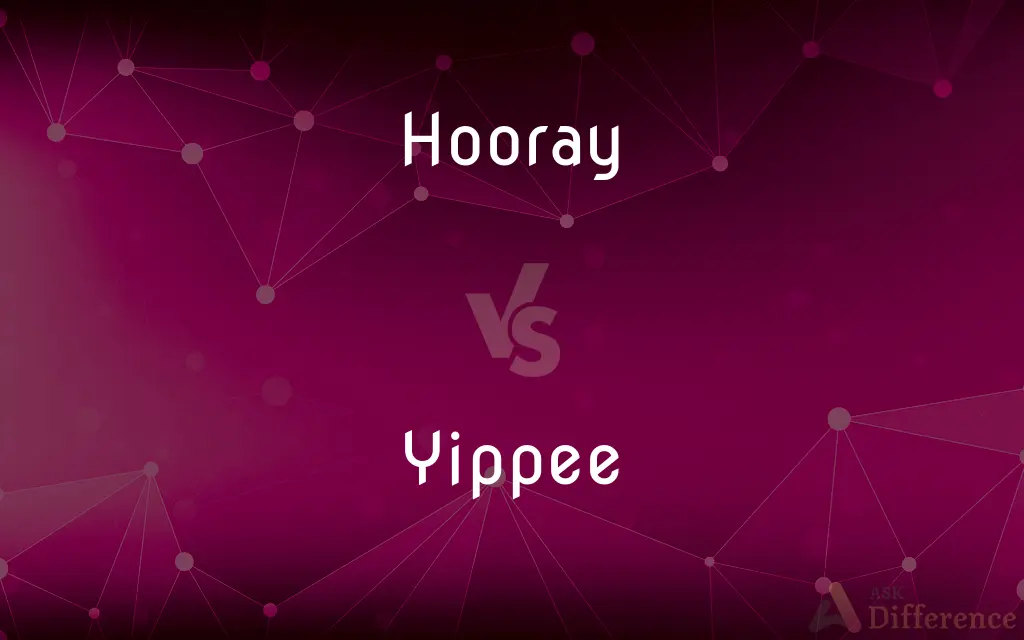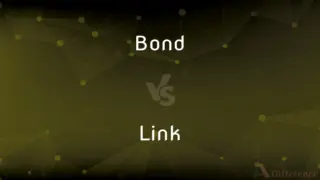Hooray vs. Yippee — What's the Difference?
By Maham Liaqat & Urooj Arif — Updated on March 26, 2024
"Hooray" is a traditional cheer expressing joy or approval, often used in group celebrations. "Yippee" conveys enthusiastic joy or delight, typically reflecting a more personal excitement.

Difference Between Hooray and Yippee
Table of Contents
ADVERTISEMENT
Key Differences
"Hooray" is a versatile exclamation used to express approval, joy, or encouragement, commonly heard in collective settings like parties or competitions. It serves as a way to unite people in a moment of celebration or achievement. "Yippee," on the other hand, is a spirited expression of personal excitement or jubilation, often used in moments of personal triumph or when sharing good news.
While "hooray" has a formal tone and is associated with traditional celebrations, making it suitable for a wide range of public and ceremonial occasions, "yippee" feels more informal and spontaneous. This informality makes "yippee" more common in casual conversations, especially when expressing genuine personal happiness or enthusiasm.
In terms of linguistic usage, "hooray" is often accompanied by gestures like throwing hats in the air or clapping, enhancing the communal aspect of the celebration. "Yippee," while also capable of being accompanied by gestures, is more about vocalizing individual excitement, and the exclamation itself is often enough to convey the emotion.
The origin of "hooray" is believed to be from the sailor's cheer "huzzah," which dates back to the 18th century, giving it a historical and somewhat formal or traditional connotation. "Yippee," with its origins in the early 20th century, derived from the excitement of the cowboy culture in the United States, carries a more modern and lively vibe.
Both "hooray" and "yippee" enrich the English language by providing nuanced ways to express happiness and approval. However, the choice between them often depends on the context of the celebration (public vs. personal) and the level of formality or spontaneity desired by the speaker.
ADVERTISEMENT
Comparison Chart
Tone
Formal and traditional
Informal and spontaneous
Usage Context
Group celebrations, public events
Personal achievements, casual settings
Accompanying Gestures
Clapping, hat throwing
Less specific, often vocal emphasis alone
Origin
Derived from "huzzah," 18th century
Emerged from cowboy culture, early 20th century
Connotation
Unity in celebration, approval
Personal excitement, jubilation
Compare with Definitions
Hooray
A cheer to express joy or approval.
Hooray! We won the game!
Yippee
An exclamation of personal excitement.
Yippee! I passed my exams!
Hooray
Used in celebrations and victories.
Hooray for our team's success!
Yippee
Reflects spontaneous joy.
Yippee! We're going to the amusement park!
Hooray
Associated with traditional celebrations.
Hooray for the newlyweds!
Yippee
Common in informal settings.
Yippee, it's the weekend!
Hooray
Can signify relief or accomplishment.
Hooray, the work is finally done!
Yippee
Associated with modern, lively expressions.
Yippee! Vacation starts tomorrow!
Hooray
Often part of group expressions.
Everyone shouted 'Hooray!' at the announcement.
Yippee
Can express a childlike enthusiasm.
Yippee! Ice cream for dessert!
Hooray
From the old Norse battle cry "Huer Av", meaning "Heads Off".
Yippee
Yippee, also known as Yippee: A Journey to Jewish Joy, is a 2006 documentary film directed by and starring Paul Mazursky. The film follows Mazursky's journey to a small town in Ukraine, to witness and participate in a three-day festival of over 25,000 singing, dancing, praying, and emotionally elevated Hasidic Jews.
Hooray
Used as an exclamation of pleasure, approval, elation, or victory.
Yippee
Used to express joy or elation.
Hooray
A shout of "hooray."
Yippee
Used to express joy or elation.
Hooray
Excitement; fanfare.
Hooray
To applaud, cheer, or approve (someone or something) by shouting "hooray."
Hooray
To shout "hooray."
Hooray
Used to express approval, joy or victory.
Lizzie has broken a world record, and she is now an Olympic medallist! – Hooray!
Hooray
A shout to signify victory.
Hooray
An expression of excitement.
Hooray
To shout an expression of excitement.
Hooray
A victory cheer;
Let's give the team a big hurrah
Common Curiosities
Can "hooray" and "yippee" be used interchangeably?
While they both express happiness, their use depends on formality, context, and whether the celebration is personal or collective.
What does "hooray" typically express?
"Hooray" expresses joy, approval, or encouragement, often in group settings.
When is "yippee" most commonly used?
"Yippee" is used to convey personal excitement or delight, typically in more casual or informal contexts.
What are the origins of "hooray"?
"Hooray" is believed to originate from the sailor's cheer "huzzah," dating back to the 18th century.
Can "yippee" be used in formal settings?
"Yippee" is more informal and spontaneous, making it less typical for formal settings but not entirely inappropriate, depending on the context.
Why might someone choose "yippee" over "hooray"?
They might choose "yippee" for a more personal, informal expression of joy or when the celebration is more about personal achievement.
How did "yippee" come into usage?
"Yippee" emerged from the cowboy culture in the United States in the early 20th century, reflecting exuberance and excitement.
Do "hooray" and "yippee" imply different levels of excitement?
Not necessarily different levels, but they convey excitement in different contexts; "hooray" is more communal, while "yippee" is personal.
What gestures accompany "hooray"?
Common gestures include clapping, throwing hats, or other signs of collective celebration.
Can "hooray" be considered old-fashioned?
Some may view "hooray" as more traditional, but it remains widely used and understood in contemporary celebrations.
Does "yippee" have a modern connotation?
Yes, "yippee" has a more modern and lively vibe, reflecting spontaneous personal excitement.
Is "yippee" associated with certain gestures?
While specific gestures aren't strongly associated with "yippee," it often accompanies spontaneous expressions of joy, like jumping or clapping.
How do cultural differences affect the use of "hooray" and "yippee"?
Cultural context can influence the preference for one over the other, with "hooray" being more universally recognized in English-speaking cultures, while "yippee" might be seen as more culturally specific or informal.
Is "hooray" appropriate for formal events?
Yes, "hooray" is suitable for formal and traditional celebrations due to its historical connotation.
How does the audience affect the choice between "hooray" and "yippee"?
The choice depends on whether the expression of happiness is intended for a group celebration ("hooray") or a personal expression of excitement ("yippee").
Share Your Discovery

Previous Comparison
Bond vs. Link
Next Comparison
Anorexia vs. AnorecticAuthor Spotlight
Written by
Maham LiaqatCo-written by
Urooj ArifUrooj is a skilled content writer at Ask Difference, known for her exceptional ability to simplify complex topics into engaging and informative content. With a passion for research and a flair for clear, concise writing, she consistently delivers articles that resonate with our diverse audience.
















































